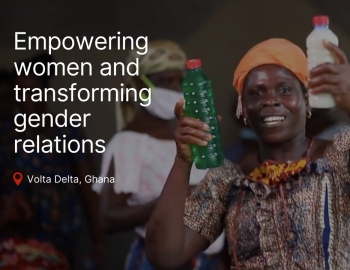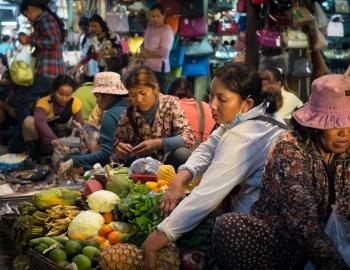Training handbook for climate-adaptive, resilient livelihoods in the Volta delta, Ghana
Training handbook for climate-adaptive, resilient livelihoods in the Volta delta, Ghana
The Regional Institute for Population Studies, University of Ghana, has produced a handbook for strengthening the resilience of women and other groups who face local climate change impacts and related economic challenges in Ghana’s Volta delta region.
In the Volta delta region, coastal erosion and the salinisation of groundwater and lagoons have adversely affected communities’ fishing and agricultural livelihoods. The lack of opportunities to earn a living locally has led to the migration of men, leaving the highest number of female-headed households in Ghana.
The CDKN-funded project, Empowering women and transforming gender relations in the Volta delta, Ghana, sought to build women’s adaptive capacities and improve their agricultural activities to ultimately become more resilient to the impacts of climate change. This included training on alternative livelihoods, business management and marketing, packaging of agricultural products, access to regional markets, crop diversification, value-addition to produce and accessing microfinance for their businesses.
How the handbook was used in training women’s groups
The pilot training programme, for which this handbook was first developed, targeted women’s groups in the towns of Keta and Sogakope in the Volta delta region. The authors first undertook a baseline study of women’s socioeconomic status and climate-related risks and followed this with a needs assessment study. Thereafter, facilitators were identified within the Keta and Sogakope communities to deliver the various sections of this guide in the local Ewe language.
Facilitators were then trained to deliver the training with a mixture of PowerPoint presentations, plenary discussions and group assignments. This was to ensure the full participation of the women. Creative teaching methods such as drawings, storytelling, counting, videos and photos were also used to deliver the content of this handbook.
What does the handbook cover?
The handbook presents the training programme that was piloted in Keta and Sogakope.
The handbook is comprised of four modules:
- Value addition: To equip participants with skills in process improvement, packaging and product certification.
- Business management: To equip participants with business management skills for increased profit margins and control over business operations.
- Business finance: To assist women in managing and controlling their cash flow.
- Women empowerment and leadership: To deepen leadership capacity and potential by strengthening women’s groups and cooperatives.
Download and read the handbook here: Training handbook for climate-adaptive, resilient livelihoods



